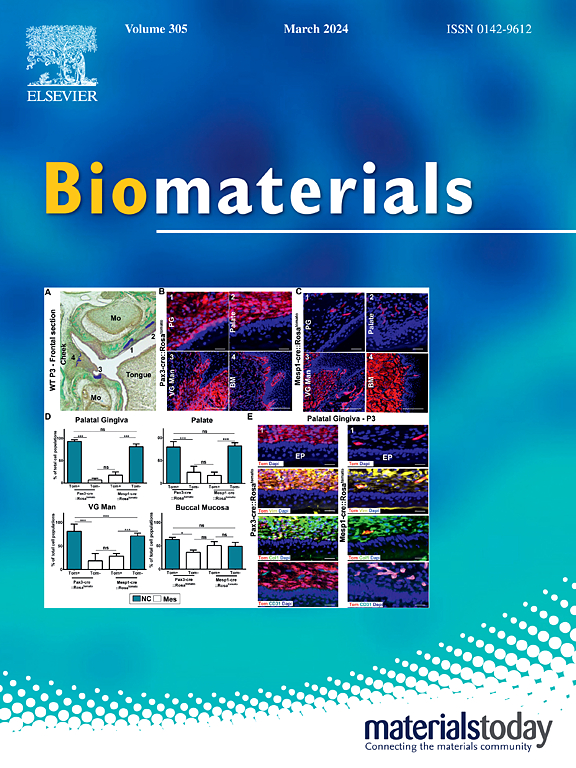亮氨酸衍生物佐剂LNP疫苗通过mTOR激活和树突状细胞代谢重编程增强抗肿瘤免疫
IF 12.9
1区 医学
Q1 ENGINEERING, BIOMEDICAL
引用次数: 0
摘要
新抗原衍生肽疫苗已被用于治疗肿瘤,然而,其低效率的递送和抗原性仍然具有挑战性。本研究首次将亮氨酸衍生物LLOMe (L-leucyl-l-leucine methyl ester)作为佐剂,增强基于脂质纳米颗粒(LNP)的肽疫苗的免疫应答。从机制上讲,LLOMe破坏了疫苗的溶酶体包裹,从而有效地提高了抗原的生物利用度。此外,发现疫苗中的LLOMe通过mTOR编程代谢刺激APCs的功能水平,而mTOR抑制剂雷帕霉素可以消除LLOMe的佐剂作用。在接受由LLOMe佐剂的预防性或治疗性疫苗接种的各种动物肿瘤模型中,通过增强抗原的递送和调节细胞免疫反应,有效抑制肿瘤生长。本研究表明,llome诱导的佐剂性可显著增强LNP疫苗的抗肿瘤免疫,为开发癌症疫苗提供了临床转化和有效的佐剂策略。本文章由计算机程序翻译,如有差异,请以英文原文为准。
A leucine derivate-adjuvanted LNP vaccine enhances antitumor immunity through mTOR activation and metabolic reprograming in dendritic cells
Neoantigen-derived peptide vaccines have been emergingly employed to treat tumors, however, their inefficient delivery and antigenicity remain challenging. In this study, for the first time a leucine derivate LLOMe (L-leucyl-l-leucine methyl ester) was repurposed to the adjuvant to reinforce the immune responses of lipid nanoparticle (LNP)-based peptide vaccine. Mechanistically, LLOMe disrupted the lysosomal entrapment of vaccine thus effectively enhanced bioavailability of antigens. Moreover, LLOMe in vaccine was found to stimulate the functional level of APCs via mTOR programed metabolism, while mTOR inhibitor rapamycin could abolish the adjuvating effect of LLOMe. In various animal tumor models receiving prophylactic or therapeutic vaccinations adjuvanted by LLOMe, the effective suppression of tumor growth was achieved through enhanced delivery of antigens and modulation of cellular immune responses. This study demonstrated that LLOMe-induced adjuvanticity significantly enhance the anti-tumor immunity of LNP vaccines, providing a clinically translational and potent adjuvant strategy for developing cancer vaccines.
求助全文
通过发布文献求助,成功后即可免费获取论文全文。
去求助
来源期刊

Biomaterials
工程技术-材料科学:生物材料
CiteScore
26.00
自引率
2.90%
发文量
565
审稿时长
46 days
期刊介绍:
Biomaterials is an international journal covering the science and clinical application of biomaterials. A biomaterial is now defined as a substance that has been engineered to take a form which, alone or as part of a complex system, is used to direct, by control of interactions with components of living systems, the course of any therapeutic or diagnostic procedure. It is the aim of the journal to provide a peer-reviewed forum for the publication of original papers and authoritative review and opinion papers dealing with the most important issues facing the use of biomaterials in clinical practice. The scope of the journal covers the wide range of physical, biological and chemical sciences that underpin the design of biomaterials and the clinical disciplines in which they are used. These sciences include polymer synthesis and characterization, drug and gene vector design, the biology of the host response, immunology and toxicology and self assembly at the nanoscale. Clinical applications include the therapies of medical technology and regenerative medicine in all clinical disciplines, and diagnostic systems that reply on innovative contrast and sensing agents. The journal is relevant to areas such as cancer diagnosis and therapy, implantable devices, drug delivery systems, gene vectors, bionanotechnology and tissue engineering.
 求助内容:
求助内容: 应助结果提醒方式:
应助结果提醒方式:


